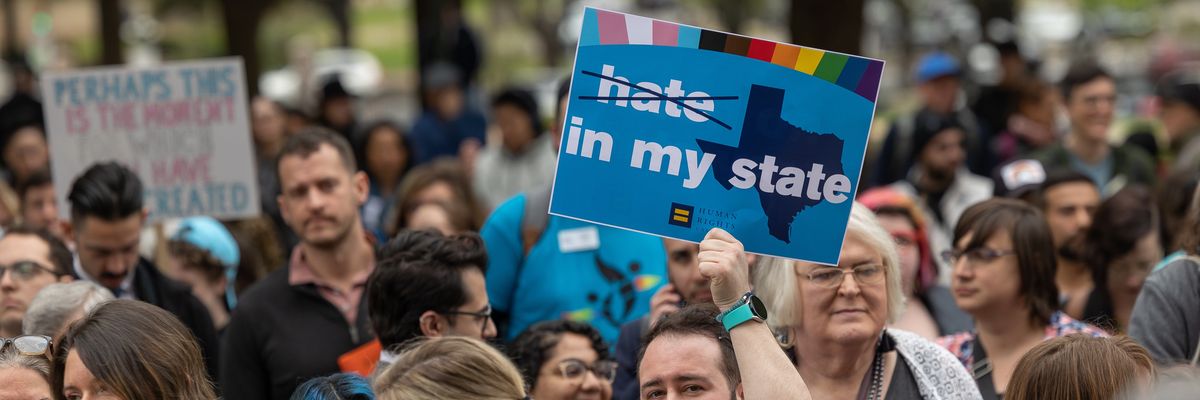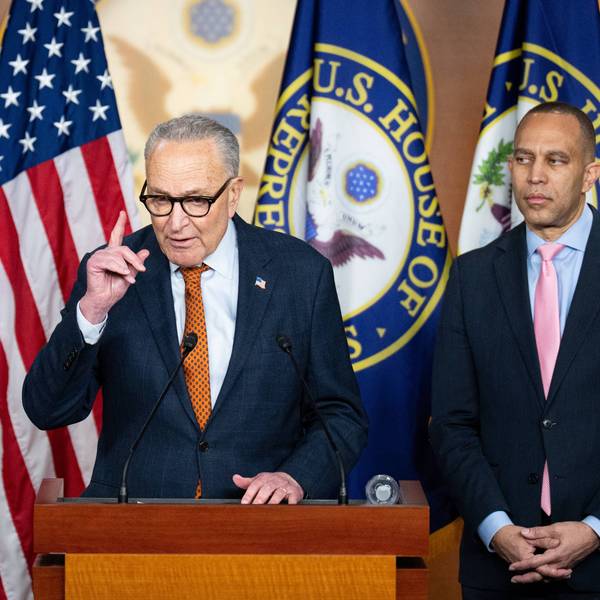
Trans rights supporters rally in Austin, Texas on March 20, 2023.
Texas Supreme Court Allows State's 'Cruel' Gender-Affirming Care Ban to Take Effect
"The fight is far from over," said the groups that sued Texas over the ban.
The Texas Supreme Court, made up entirely of Republicans, decided Thursday to allow a ban on gender-affirming healthcare for trans youth to take effect on September 1, rejecting an emergency effort by advocacy groups to block the law.
The decision came a week after a Texas district judge temporarily halted the Republican-authored law, arguing that S.B. 14 infringes on the "fundamental right of parents to make decisions concerning the care, custody, and control of their children."
Texas officials swiftly appealed the district judge's decision, prompting the rights groups that sued over the law to file an emergency request urging the state's high court to prevent enforcement of the ban, which Texas Gov. Greg Abbott signed into law in June.
The Supreme Court's order allowing the law to take effect on Friday offered no explanation for the decision.
As The Associated Press summarized, S.B. 14 "would prevent transgender minors from accessing hormone therapies, puberty blockers, and transition surgeries, even though medical experts say such surgical procedures are rarely performed on children."
"Children who already started the medications being banned are required to be weaned off in a 'medically appropriate' manner," the outlet added.
Lambda Legal, the American Civil Liberties Union, the ACLU of Texas, and the Transgender Law Center issued a joint statement on Thursday declaring that "the fight is far from over."
"Today's cruel ruling places Texas' transgender youth, and the families and medical professionals who love and care for them, directly in harm's way," the organizations said. "The district court heard two days of testimony, weighed the evidence, and made a reasoned and thoughtful determination that the ban likely violated the Texas Constitution, and thus should be delayed while the full case plays out in court."
"Inexplicably, the Texas Supreme Court disagreed, and transgender Texas youth and their families are forced to confront the start of the school year fearful of what awaits them," the coalition added. "The district court clearly articulated the ways in which S.B. 14 likely violates the Texas Constitution by infringing upon the fundamental right of parents to make decisions concerning the care, custody, and control of their children, infringing upon Texas physicians' right of occupational freedom, and discriminating against transgender adolescents with gender dysphoria because of their sex, sex stereotypes, and transgender status. We couldn't agree more and look forward to continuing this fight."
With the enactment of S.B. 14, Texas will become one of more than a dozen U.S. states that have imposed legal restrictions on gender-affirming care.
If it was left in place, the district court's injunction against the law "would have blocked the state attorney general's office, the Texas Medical Board, and the Texas Health and Human Services Commission from enforcing the law," The Texas Tribune reported Thursday.
The judge in the case "wrote that transgender youth and their families would 'suffer probable, imminent, and irreparable injury' if S.B. 14 went into effect while the legal battle ensues," the newspaper added. "A trial is set to begin May 6."
This story has been updated to clarify that the joint statement was issued by advocacy groups, not the law firms involved in the case.
An Urgent Message From Our Co-Founder
Dear Common Dreams reader, The U.S. is on a fast track to authoritarianism like nothing I've ever seen. Meanwhile, corporate news outlets are utterly capitulating to Trump, twisting their coverage to avoid drawing his ire while lining up to stuff cash in his pockets. That's why I believe that Common Dreams is doing the best and most consequential reporting that we've ever done. Our small but mighty team is a progressive reporting powerhouse, covering the news every day that the corporate media never will. Our mission has always been simple: To inform. To inspire. And to ignite change for the common good. Now here's the key piece that I want all our readers to understand: None of this would be possible without your financial support. That's not just some fundraising cliche. It's the absolute and literal truth. We don't accept corporate advertising and never will. We don't have a paywall because we don't think people should be blocked from critical news based on their ability to pay. Everything we do is funded by the donations of readers like you. Will you donate now to help power the nonprofit, independent reporting of Common Dreams? Thank you for being a vital member of our community. Together, we can keep independent journalism alive when it’s needed most. - Craig Brown, Co-founder |
The Texas Supreme Court, made up entirely of Republicans, decided Thursday to allow a ban on gender-affirming healthcare for trans youth to take effect on September 1, rejecting an emergency effort by advocacy groups to block the law.
The decision came a week after a Texas district judge temporarily halted the Republican-authored law, arguing that S.B. 14 infringes on the "fundamental right of parents to make decisions concerning the care, custody, and control of their children."
Texas officials swiftly appealed the district judge's decision, prompting the rights groups that sued over the law to file an emergency request urging the state's high court to prevent enforcement of the ban, which Texas Gov. Greg Abbott signed into law in June.
The Supreme Court's order allowing the law to take effect on Friday offered no explanation for the decision.
As The Associated Press summarized, S.B. 14 "would prevent transgender minors from accessing hormone therapies, puberty blockers, and transition surgeries, even though medical experts say such surgical procedures are rarely performed on children."
"Children who already started the medications being banned are required to be weaned off in a 'medically appropriate' manner," the outlet added.
Lambda Legal, the American Civil Liberties Union, the ACLU of Texas, and the Transgender Law Center issued a joint statement on Thursday declaring that "the fight is far from over."
"Today's cruel ruling places Texas' transgender youth, and the families and medical professionals who love and care for them, directly in harm's way," the organizations said. "The district court heard two days of testimony, weighed the evidence, and made a reasoned and thoughtful determination that the ban likely violated the Texas Constitution, and thus should be delayed while the full case plays out in court."
"Inexplicably, the Texas Supreme Court disagreed, and transgender Texas youth and their families are forced to confront the start of the school year fearful of what awaits them," the coalition added. "The district court clearly articulated the ways in which S.B. 14 likely violates the Texas Constitution by infringing upon the fundamental right of parents to make decisions concerning the care, custody, and control of their children, infringing upon Texas physicians' right of occupational freedom, and discriminating against transgender adolescents with gender dysphoria because of their sex, sex stereotypes, and transgender status. We couldn't agree more and look forward to continuing this fight."
With the enactment of S.B. 14, Texas will become one of more than a dozen U.S. states that have imposed legal restrictions on gender-affirming care.
If it was left in place, the district court's injunction against the law "would have blocked the state attorney general's office, the Texas Medical Board, and the Texas Health and Human Services Commission from enforcing the law," The Texas Tribune reported Thursday.
The judge in the case "wrote that transgender youth and their families would 'suffer probable, imminent, and irreparable injury' if S.B. 14 went into effect while the legal battle ensues," the newspaper added. "A trial is set to begin May 6."
This story has been updated to clarify that the joint statement was issued by advocacy groups, not the law firms involved in the case.
The Texas Supreme Court, made up entirely of Republicans, decided Thursday to allow a ban on gender-affirming healthcare for trans youth to take effect on September 1, rejecting an emergency effort by advocacy groups to block the law.
The decision came a week after a Texas district judge temporarily halted the Republican-authored law, arguing that S.B. 14 infringes on the "fundamental right of parents to make decisions concerning the care, custody, and control of their children."
Texas officials swiftly appealed the district judge's decision, prompting the rights groups that sued over the law to file an emergency request urging the state's high court to prevent enforcement of the ban, which Texas Gov. Greg Abbott signed into law in June.
The Supreme Court's order allowing the law to take effect on Friday offered no explanation for the decision.
As The Associated Press summarized, S.B. 14 "would prevent transgender minors from accessing hormone therapies, puberty blockers, and transition surgeries, even though medical experts say such surgical procedures are rarely performed on children."
"Children who already started the medications being banned are required to be weaned off in a 'medically appropriate' manner," the outlet added.
Lambda Legal, the American Civil Liberties Union, the ACLU of Texas, and the Transgender Law Center issued a joint statement on Thursday declaring that "the fight is far from over."
"Today's cruel ruling places Texas' transgender youth, and the families and medical professionals who love and care for them, directly in harm's way," the organizations said. "The district court heard two days of testimony, weighed the evidence, and made a reasoned and thoughtful determination that the ban likely violated the Texas Constitution, and thus should be delayed while the full case plays out in court."
"Inexplicably, the Texas Supreme Court disagreed, and transgender Texas youth and their families are forced to confront the start of the school year fearful of what awaits them," the coalition added. "The district court clearly articulated the ways in which S.B. 14 likely violates the Texas Constitution by infringing upon the fundamental right of parents to make decisions concerning the care, custody, and control of their children, infringing upon Texas physicians' right of occupational freedom, and discriminating against transgender adolescents with gender dysphoria because of their sex, sex stereotypes, and transgender status. We couldn't agree more and look forward to continuing this fight."
With the enactment of S.B. 14, Texas will become one of more than a dozen U.S. states that have imposed legal restrictions on gender-affirming care.
If it was left in place, the district court's injunction against the law "would have blocked the state attorney general's office, the Texas Medical Board, and the Texas Health and Human Services Commission from enforcing the law," The Texas Tribune reported Thursday.
The judge in the case "wrote that transgender youth and their families would 'suffer probable, imminent, and irreparable injury' if S.B. 14 went into effect while the legal battle ensues," the newspaper added. "A trial is set to begin May 6."
This story has been updated to clarify that the joint statement was issued by advocacy groups, not the law firms involved in the case.

